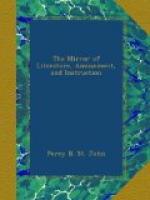* * * * *
SONG.
By JOANNA BAILLIE.
The gliding fish that takes his play
In shady nook of streamlet cool,
Thinks not how waters pass away,
And summer dries the pool.
The bird beneath his leafy dome
Who trills his carol, loud
and clear,
Thinks not how soon his verdant home
The lightning’s breath
may sear.
Shall I within my bridegroom’s bower
With braids of budding roses
twined,
Look forward to a coming hour
When he may prove unkind?
The bee reigns in his waxen cell,
The chieftain in his stately hold,
To-morrow’s earthquake,—who can
tell?
May both in ruin fold.
* * * * *
The Gatherer.
“A snapper-up of unconsidered trifles.” SHAKSPEARE.
CATS (again.)
Charles James Fox walking up Bond-street from one of the club-houses with an illustrious personage, laid him a wager, that he would see more cats than the prince in his walk, and that he might take which side of the street he liked. When they got to the top, it was found that Mr. Fox had seen thirteen cats, and the prince not one. The royal personage asked for an explanation of this apparent miracle; Mr. Fox said, “Your royal highness took, of course, the shady side of the way, as most agreeable; I knew that the sunny side would be left for me, and cats always prefer the sunshine.”
* * * * *
VAUXHALL WEATHER.
It having happened for several successive summers, that wet weather took place just as the Vauxhall season commenced, Tom Lowe, Tyers’s principal vocal performer, accidentally meeting the proprietor, expressed an anxious desire to know when he meant to open his gardens. “Why are you so particular, Mr. Lowe?” said Jonathan. “I have a very good reason, sir, and should like to know the very day.” “Why, why?” reiterated Tyers, impatiently. “That I may bespeak a great coat to sing in; for you know we shall be sure to have rain.”
* * * * *
LAME SINGING.
A few days since, a musicsellers’s boy was sent to the publisher’s for a number of copies of the song “I’d be a Butterfly, arranged for two trebles;” when, on being desired to repeat his order, he replied, “I’d be a Butterfly, arranged for two cripples.”
* * * * *
LAUGHTER.
Democritus, who was always laughing, lived one hundred and nine years; Heraclitus, who never ceased crying, only sixty. Laughing then is best; and to laugh at one another is perfectly justifiable, since we are told that the gods themselves, though they made us as they pleased, cannot help laughing at us.




